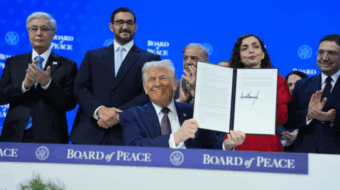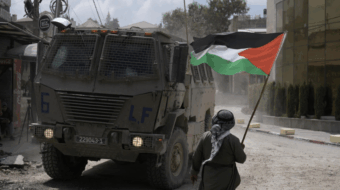
Once again, the government of Israeli Prime Minister Benjamin Netanyahu is on the brink of collapse. And once again, he is choosing to spread war, death, and destruction to preserve his hold on power.
This week, the two Haredi (ultra-Orthodox) political parties—United Torah Judaism (UTJ) and Shas—announced plans to leave Netanyahu’s coalition. They are demanding the passage of a law that would continue to exempt their ultra-Orthodox constituents from military conscription.
The proposal faces fierce opposition from within Netanyahu’s own Likud party and other coalition members. Should UTJ and Shas exit the ruling coalition, Netanyahu would lose his parliamentary majority in the Knesset.
Meanwhile, Netanyahu’s long-running corruption trial has moved into a more dangerous phase for the embattled prime minister. He is now forced to testify under oath. The charges against him—bribery, fraud, and breach of trust—are backed by damning evidence, including recordings and testimony from his former aides.
In an astonishing and unprecedented move, U.S. President Donald Trump publicly urged the Israeli courts to drop the case. Even more brazenly, U.S. Ambassador to Israel Mike Huckabee appeared in court, a gesture widely interpreted as an unsubtle attempt to intimidate the judiciary. An editorial in the Israeli newspaper Haaretz described it as “mafia-esque” intimidation by the U.S. diplomat.
Walls closing in
With the walls closing in, Netanyahu has once again returned to his most reliable political strategy: bombing Arabs and launching wars.
In fact, his testimony in court was cut short because he ordered the Israeli Air Force to bomb the Syrian Ministry of Defense, in the center of Damascus. His Minister for Diaspora Affairs, Amichai Chikli, went further, calling for the “elimination” of Syrian President Ahmad al-Sharaa.
This is hardly the first time Netanyahu has turned to war to save his political skin. In September 2023, Israel was rocked by unprecedented civil unrest. Protesters flooded the streets demanding Netanyahu’s resignation. Military pilots and reservists refused to serve so long as he remained in power. Many feared the country teetered on the edge of civil conflict.
Then came October 7th. Hamas launched a surprise attack, and Netanyahu responded with a genocidal war on the people of Gaza that continues to this day. Israeli dissent evaporated almost overnight.
The pilots returned to their squadrons; the protests ended. Thousands of Palestinians have been killed. Entire neighborhoods in Gaza have been reduced to rubble.
Netanyahu’s fiercest critics joined his war cabinet in the name of “national unity.” Even opposition figure Gideon Sa’ar, whose whole political identity was built on staunch opposition to Netanyahu, fell into line, joining his sworn enemy’s government.
Seeing how effective this cynical strategy could be, Netanyahu used it again in June of this year. On June 4, 2025, the Council of Torah Sages—the rabbinical body that guides UTJ—formally instructed its parliamentarians to introduce a bill dissolving the Knesset. Opposition parties, including Yisrael Beiteinu and the centrist Democrats, signaled support. Netanyahu’s government was on the verge of collapse.
The massive war that followed lasted twelve days. Hundreds of Iranians were killed. Dozens of Israeli civilians died. Missile strikes damaged civilian centers in both countries. Thousands were displaced. The scale of devastation in Israel was unlike anything it had experienced before; airports closed, electricity grids and ports were hit, and civilians were sheltering in underground stations for days.
But politically, the war served its purpose. Once again, the country rallied together in a time of war, and Netanyahu’s coalition held. The threat of a dissolved government disappeared.
Now, once more, we watch as Netanyahu drops bombs on cities to serve his own political survival. Whether the strategy works again remains to be seen. But increasingly, Israelis are beginning to see through the pattern and recognize Netanyahu’s self-serving manipulation of war and military power.
The question is: How many wars will be launched, and how many more people will die before Netanyahu is finally removed from power?










